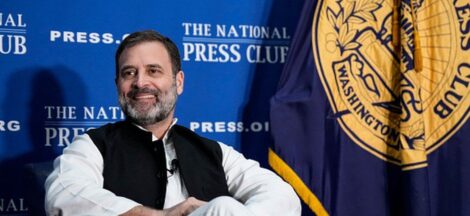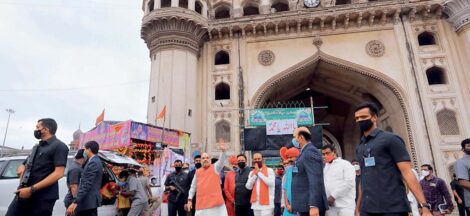By Sukumar Damle
It all started in 1990s with the advent of ‘Structural Adjustment’ agreed to by the then Congress government at the Centre. Sukhram, the then telecom minister, presented a Bill in Parliament, to turn the department of telecommunications into a corporate body. BJP, whose strength had gone up to 88 by then, opposed the bill, holding up Parliament for a spell of 14 days. The Congress government was forced to withdraw the Bill.
When the government was replaced by the NDA government, led by the BJP, it brought the same Bill before Parliament. So, the drama played by the BJP regarding Land Acquisition Act or the GST in its present tenure has a precedence, first oppose and then do the very thing you oppose. According to the National Federation of Telecom Employees (NFTE) sources, the bill was referred to the Parliamentary Committee headed by no less a person than Somnath Chatterjee of the CP1(M). But even this committee approved the plan for corporatisation of the telecom department.
The NFTE opposed the move with a country- wide strike on September 5, 7 and 8, 2000. The government constituted an Empowered Committee, comprising six ministers, to talk to the Federation, which assured them that (1) their employment will be protected; (2) their pension will be paid out of the government funds even if privatisation takes place; and (3) the proposed corporation will be kept financially viable.
It was on this assurance that the strike was withdrawn and the Bharat Sanchar Nigam Limited (BSNL) came into being on October 1, 2000, with about 3.5 lakh employees, one lakh executives and 2.5 lakh non-executives, catering to telephone system throughout India. Then NFTE renowned leader O P Gupta had demanded that if at all the corporation has to be formed, it should be by an Act of Parliament. But it was not accepted and the corporation was registered under the Companies Act 1956.
Telephone Nigam Limited (MTNL) was carved out even earlier, for the cities of New Delhi and Mumbai only with 46 per cent of equity of MTNL sold on the stock market. Till the year 2004, BSNL was in profit, of Rs 10,500 crore and had a Reserve Fund of Rs 40,000 crore. The total assets were Rs 1,04,000 crore.
Side by side, the NDA government started privatisation of various other telecom services: Paging System, for example. Jagmohan was the telecom minister and tenders were called for. The private companies that won the contract neither paid up the licence fees nor the fines imposed on them for flouting the norms set by the government. It was then that the blue-eyed boy of NDA government, Pramod Mahajan, stepped in to waive off all such amount to the benefit, mainly of Reliance outfit, Reliance Communications (RCOM).
It is a widely known fact now that after Dhirubhai Ambani passed away and his empire was divided amongst warring brothers, RCOM came to Anil Ambani, which thereafter sank with an NPA amounting to Rs 45,000 crore. It was partially bought off by Mukesh Ambani and has now bagged defence orders to be manufactured in MIHAN, Nagpur.
Coming back to BSNL story, it was not allowed to bid for this tender. It was deliberately kept out of the mobile sector. It was only in 2002 that BSNL got the licence to enter the mobile sector and that too by going to Delhi High court and obtaining an order for the Union government to allow BSNL in the mobile sector. The Delhi High Court had rightly asked the Union government, ‘why level-playing ground was not being provided to BSNL?’
Though entering the field after every other private company, within the period from 2002 to 2005, the BSNL came to the top, with the biggest share of the mobile market. Even the rates being charged to customers were brought down with the entry of BSNL.
Thereafter, BSNL asked permission to procure equipment needed to expand the network to additional 45 lakh customers. Dayanidhi Maran, the Telecom Minister in UPA-1 government, sat on the request for two years. The employees had to strike work (July 11, 2007) to prod the minister to give that permission. And the permission was given for 22.5 lakh mobiles! By that time, the private companies had expanded to occupy the market, even by blatantly transgressing the conditions of the licenses issued to them.
Another requirement was that each private company must have 20 per cent of its business in rural areas. This condition was just not followed and the TRAI (Telecom Regulatory Authority of India) looked the other way. The BSNL dutifully took up this burden, which is not profitable and helped in bringing the hinterlands of the country in the mainstream. This was termed Universal Social Obligation (USO), for which the government compensated only till 2011, and then, the government support was stopped.
Similarly, the government used to pay Annual Deficit Charge (ADC) to the BSNL to compensate for use of BSNL landline network by private companies. Now, the government has not only stopped ADC compensation, but proposes further to form a separate company out of the assets of BSNL, consisting of 65000 towers, and the BSNL will also have to pay for the use of these towers.
2010 turned out to be a difficult year for BSNL. In June, 2010, 3-G spectrum bidding took place. BSNL was barred from bidding. When the bidding by private companies, fixed a price, BSNL was asked to pay Rs.18500 crore for pan-India license. This was totally unfair, as the private companies could bid only for a few circles of their choice and were not required to bid for the entire country. They then tied up among themselves to provide pan-India service. This was against the bidding regulations. Yet TRAI and the ministry kept quiet. When the employees’ Federation protested, the CMD withheld the payment of Rs.18500/-crore for two days, for which BSNL was fined Rs.30/- crore.
Again it was in 2010, when the government demanded of BSNL return of the working capital of Rs.7500 crore, advanced initially at the time of formation of the Corporation on the condition that it will not be asked to be returned and that it will be interest-free. Now an interest of 14 percent was also levied, thus emptying the coffers of BSNL (Rs.40000 crore). The BSNL now is working from hand-to-mouth against monoliths like the Reliance Jio.
In October, 2017, Reliance Jio entered the market with Prime Minister Modi acting as the company’s brand ambassador! Jio offered their services free for six months – again against the TRAI guidelines, which restrict such promotional measures to three months only. BSNL’s woes further aggravated and made it uncompetitive. (IPA Service)
The post Modi Govt’s Policies Have Virtually Crippled BSNL appeared first on Newspack by India Press Agency.


